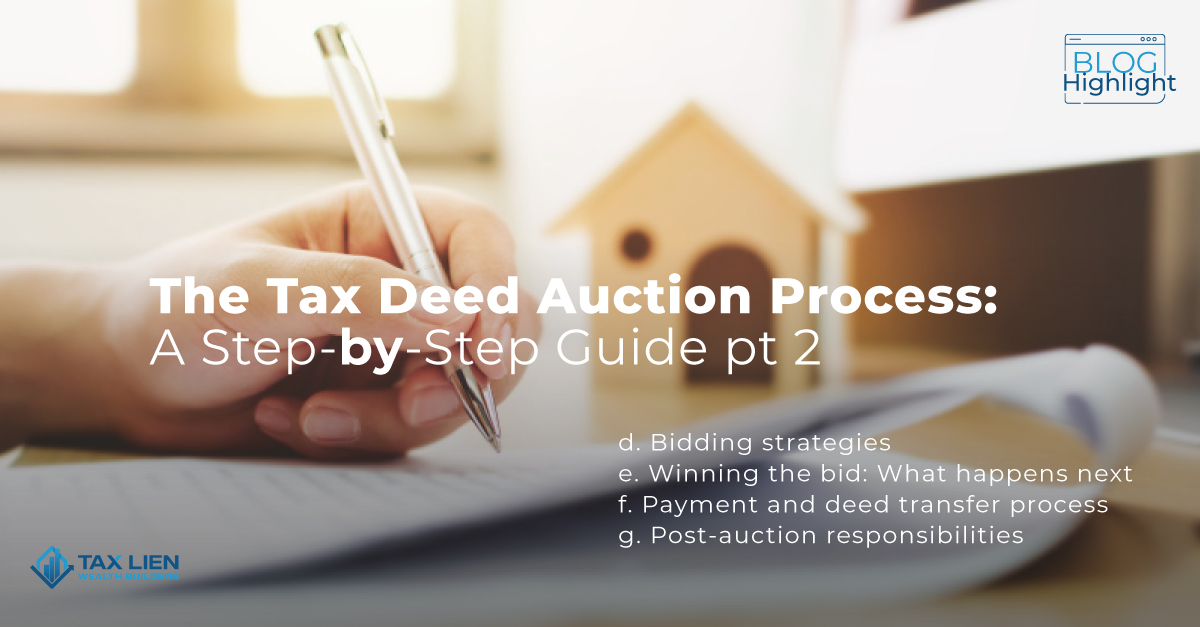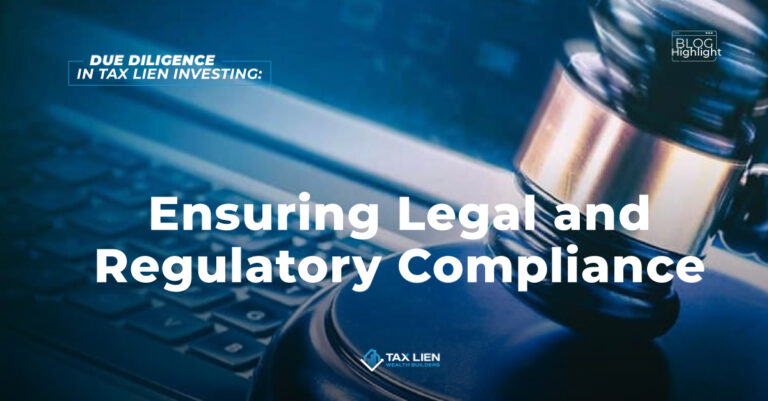The Tax Deed Auction Process: A Step-by-Step Guide Part 2
In Part 1 of our guide, we covered the essential steps to prepare for a tax deed auction, including identifying upcoming auctions, obtaining auction lists, setting a budget, and understanding the types of auctions.
Now we will delve into bidding strategies, the process after winning a bid, payment and deed transfer, and post-auction responsibilities.
This comprehensive guide aims to equip you with the knowledge to successfully navigate the tax deed auction process and maximize your investment potential.
How to Bid as an Investor
Bidding strategies
Research and preparation: Effective bidding starts with thorough research and preparation. Here are key steps to consider.
Property research: Conduct a detailed analysis of each property on the auction list. Check property records, market values, and any existing liens or encumbrances
Auction rules: Familiarize yourself with the auction rules and bidding procedures. Each auction may have different requirements and guidelines.
Maximum bid limit: Determine your maximum bid for each property based on your budget and potential return on investment.
Bidding tactics
When it comes to the actual auction, strategic bidding can make a significant difference. Here is an example to follow.
Opening bid: consider starting with a low bid to gauge interest from other bidders. However, be prepared to increase your bid if necessary.
Incremental bidding: Increase your bids in small increments to stay competitive without overshooting your budget.
Observe competitors: Pay attention to other bidders strategies and adjust your approach accordingly. Stay calm and avoid emotional bidding.
What Happens After You Win A Bid?
Winning a bid at a tax deed auction is an exciting moment but it is important to know the next step to take after. Here is a playdown on what happens after;
Confirmation: Once you win a bid, the auctioneer will confirm your winning bid and provide instructions for the next steps.
Down payment: Some auctions require an immediate down payment or deposit. Ensure you have the necessary funds available.
Documentation: Collect and complete any required paperwork from the auctioneer or tax office to formalize your purchase.
Payment and Deed transfer process
Final Payment: After winning a bid, you must complete the payment process to finalize the purchase.
Payment deadline: Be aware of the payment deadline, which is usually within a few days of the auction. Failure to meet the deadline can result in forfeiture of your winning bid.
Payment methods Confirm the acceptable payment methods (e.g., cashier’s check, wire transfer) and ensure timely delivery.
Deed transfer: Once the final payment is made, the deed transfer process begins.
Deed Preparation: The tax office or auctioneer will prepare the deed for transfer. This may take a few weeks, depending on local procedures.
Recording the Deed: After receiving the deed, it must be recorded with the county recorder’s office to officially transfer ownership to you.
Title Insurance: Consider obtaining title insurance to protect against any potential claims or disputes over the property.
Post-auction responsibilities
Property inspection and maintenance: After the deed is transferred, inspect the property and address any immediate maintenance needs.
Property Condition: Conduct a thorough inspection to assess the property’s condition and identify any repairs or renovations needed.
Security: Secure the property to prevent unauthorized access and potential vandalism.
Managing liens and encumbrances
The next step is to verify and address any existing liens or encumbrances on the property.
Title search: Perform a title search to identify any outstanding liens, mortgages, or other encumbrances.
Lien resolution: Work with legal professionals to resolve any issues and ensure clear ownership of the property.
Long-term strategy: Develop a long-term strategy for the property to maximize your investment. This involves decisions on what to do with the property.
Rental or sale: Decide whether to rent out the property for passive income or sell it for a profit.
Property management: If you choose to rent, consider hiring a property management company to handle day-to-day operations.
Continued Learning: Stay updated on tax lien and tax deed investing trends, attend industry events, and network with other investors to continuously improve your investment strategies.
Successfully navigating the tax deed auction process requires careful planning, strategic bidding, and diligent post-auction management.
By following this step-by-step guide, you can enhance your chances of making profitable investments in the tax deed market.







